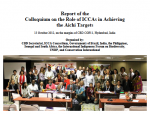 21 December 2012: The report of the Colloquium on the role of Indigenous Peoples’ and Community Conserved Areas (ICCAs) in achieving the Aichi targets of the Strategic Plan for Biodiversity 2011-2020, held on 13 October 2012 on the margins of the eleventh meeting of the Conference of the Parties to the CBD, has been made available online.
21 December 2012: The report of the Colloquium on the role of Indigenous Peoples’ and Community Conserved Areas (ICCAs) in achieving the Aichi targets of the Strategic Plan for Biodiversity 2011-2020, held on 13 October 2012 on the margins of the eleventh meeting of the Conference of the Parties to the CBD, has been made available online.
The meeting was organized by the CBD Secretariat, the ICCA Consortium, the Governments of Brazil, India, the Philippines, Senegal and South Africa, the International Indigenous Forum on Biodiversity, UN Development Programme and Conservation International. The Colloquium heard presentations about the significant levels of biodiversity and related cultural diversity contained within ICCAs, as well as the challenges to preserving these areas.
Participants pointed out that central threats to ICCA preservation included inappropriate development (such as extractive industries and large-scale infrastructure projects), the absence of clear tenure rights and the imposition of inappropriate conservation policies, among others. The lack of or weak recognition of these areas has made it difficult for indigenous peoples and local communities to deal with such challenges.
The Colloquium stressed that in order to maintain and enhance the values of ICCAs, recognition and support based on the agreement of relevant peoples or communities was urgent. Such recognition would include: clear, indivisible and inalienable common rights to territories and natural resources, in both terrestrial and marine areas; recognition of their institutions of collective governance; rights to exclude destructive activities like mining and major infrastructure; respect of diverse cultures, lifestyles, economic systems; recognition of ICCAs as protected areas or other effective area-based conservation areas as deemed appropriate by the concerned peoples and communities; and other support both technical and financial. Participants also noted that market-based measures for conservation, including those for climate-change, needed to be seriously reviewed for their possible impacts on ICCAs. [CBD Notification][Publication: Report of the Colloquium on the Role of ICCAs in Achieving the Aichi Targets]